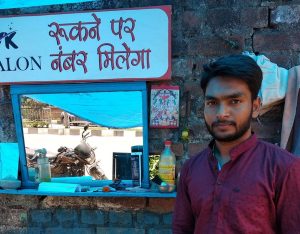People of Bharat: Vikas Thakur, Ranchi

The sound of scissors clicking becomes more salient, as I walk towards a bowed head and dexterous fingers tapering on. Vikas Thakur’s alfresco salon is left to the mercy of the weather with a worn out chair that faces the mirror hung on a brick wall under the open sky. Losing his father’s acquired land to a complex-in-making, he is left with just the pavement barber shop, a Bachelor’s degree, a family to support and a search for a suitable job to make the shift. After his graduation, Vikas also completed a course in electrical jobs from an ITI. Sporting a trendy drop fade himself, Vikas Thakur turns coy when I ask him for a photograph.
When I ask him about his typical day at work, he responds, ‘I get up early and usually done with getting ready and breakfast by 8 am. I come to my shop and make sure all the equipment is arranged before customers arrive. If they come, I trim their hair, make their beard and taper as they instruct. If they do not, I wait. I close the shop from 1 pm — 5pm to finish lunch and rest for some time. After re-opening the salon at 5, I end my work by 8 pm and the cycle continues.’ Vikas usually walks to the Salon or rides to work on his bike. The 24-year-old is the sole breadwinner of the family, has successfully juggled the job of a barber, prepped for Bank exams and still managed to bag a Diploma at OMEX.
Our conversation progresses and he tells me his family currently lives in a semi-pucca house in Ranchi, Jharkhand. Their house comprises of two plastered rooms; and is close to where he works. As a barber, he is able to earn an approximate of INR 12,000–15,000 every month. A year ago, he had borrowed a sum of INR 1,50,000, at an interest of 10% per annum to purchase a village land in his mother’s name. He lets me in on his plans of selling the land at a higher price in future.
He then goes on to talk about losing his father at the tender age of 15 years; and how he had to support his family of two siblings, a 14 year old sister, a 16 year old brother and their mother by continuing with his father’s vocation. Looking back, he still remembers the struggle. He assures that his economic condition has changed for the better, from miserable to somewhat stable now. Before picking up his father’s business full time, he tried working as a member of the verification team of a large NBFC. They had him verify identities of people who had applied for loans. But the job did not quite interest him so he decided to quit and take up his father’s business. He recounts that as a kid he would always rush to watch his father work. Helping his father with smaller tasks of trimming the moustache or shaving the beard honed his skills. He now manages a job that pays for the family expenses while he preps for his Bank entrance exams. ‘How do you manage all this?’ He reveals how he had been tirelessly trying to find a stable job but had recently agreed for a Diploma course of three years in OMEX, Haryana which has a monthly stipend of Rs 9000.
Standing beside him in his sidewalk shop, I notice a smartphone. He proudly says that it’s an Oppo F1 . He frequently does cashless transactions via PayTM, PhonePe and Google Pay. Vikas had also purchased the Pradhan Mantri Jeevan Bima Yojna that deducts it’s premium annually from his account, on his mobile app. His family spends a monthly amount of INR 5000 on ration and claims benefits from government’s Public Distribution System with his red card. He also pays the school fees for his younger siblings who are enrolled in a government school in Jagannathpur.
Our conversation gets interrupted frequently as Vikas heeds to the customer’s instructions and tries to engage in a conversation with me. ‘There are only a few customers a day. And so, I cannot pause my work. I don’t take even a day off,’ he shares in a quick 3-second pause. Picking the conversation from where we left, I ask him about his savings. Between a few reluctant smiles, he discloses he only saves INR 4000–5000 monthly which gets deposited in his bank account with the State Bank of India.
Amidst the chatter of the scissors, I ask the evergreen question — where does he see himself in the future? He proudly lists out all his dreams and how he plans to fulfil them slowly, step by step. He wishes for comfort in future, and for not just him but his entire family. Vikas Thakur wishes to get his younger sister married and and continue to support his brother’s education. A smile plays on his lips as I hear him say, ‘Jo chahiye tha, sab poora ho raha hai. Aur aage bhi hote jayega.’ (whatever I wanted, I received. And it will continue to be that way in the future too.) As far as his own aspirations go, he plans to own a house someday, get married and take care of his mother.
This research was developed as part of the Bharat Inclusion Initiative.
